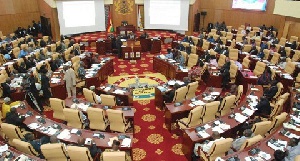- Home - News
- TWI News | TV
- Polls
- Year In Review
- News Archive
- Crime & Punishment
- Politics
- Regional
- Editorial
- Health
- Ghanaians Abroad
- Tabloid
- Africa
- Religion
- Election 2020
- Coronavirus
- News Videos | TV
- Photo Archives
- News Headlines
- Press Release
Opinions of Monday, 19 September 2016
Columnist: Kwame Gyasi
Ghana Parliament is a complete disgrace (1)
By Kwame Gyasi
There is no gainsaying the fact that the Parliament of the “Fourth Republic” has been a complete failure except for the period when the late Peter Ala Adejetey presided over the affairs of Parliament as the Speaker.
As a Speaker, Peter Ala Adejetey displayed enormous sense of fairness, independence, professionalism while also making sure that his party from which he derived his powers was not short-changed.
Today, Parliament under the present leadership has become an apology of fairness, a place of highly partisan crucible which lacks all the ingredients where intellectual debates can be articulated and the fashioning out of critical national policies to move the nation forward. Narrow, myopic and selfishness and greed have taken the center stage of the affairs of Parliament.
Parliament which should as a matter of constitutional norm act as a check on the enormous powers of the Executive has unfortunately become a useless appendage of our democratic dispensation, sort of a human appendix waiting to rapture to cause discomfort to its carrier.
In the advanced democracies, parliamentarians are given very close marking by their constituencies watching with rapt attention, the way they cast their votes and the arguments they provide in debates. Parliamentarians are expected to consult their constituencies on issues before opening their mouths and casting their votes.
In this country, what our democracy has developed are parliamentarian stomach contractors behaving and dancing to the tune of the Executive like puppets.
Our democracy has created a power base where all the powers of Parliament reside in the bosom of the Speaker, the majority leader and the majority chief whip. All others in Parliament are irrelevant where at best the minority can have its say but the majority can always have its way. Even this marginal phenomenon, of course, depends on the magnanimity of the Speaker and the way and manner he chooses to act objectively and independently.
The reason for this sordid state of affairs is not difficult to suspect. These three people, the Speaker, the majority leader and the majority chief whip all owe their existence and relevance to the Executive in situations where the President’s party also holds majority of seats in Parliament as we have witnessed since the onset of the “Fourth Republic”.
The situation has created one disaster after the other where debates are conducted and bills passed under the watchful gaze and direction of Big Brother President. The recent disgraceful and unacceptable ruling by the Speaker of Parliament to prevent parliamentarians from debating the issue of Ford Expedition gift to President John Dramani Mahama brought to the climax the disgraceful partisan posture which has characterised the performance so far of the “Fourth Republic” Parliament.
The ruling was a purely partisan effort by the Speaker to save the office of his mentor, John Dramani Mahama. It destroyed the very bastion upon which Parliament and the fabric with which Parliament is built, rendering its existence irrelevant, attacking the constitutional basis for the existence of Parliament.
To relegate the powers of Parliament to conduct investigation of national importance to a subordinate body was gross abuse of office, intellectual bankruptcy and crass professional incompetence which should never ever be repeated.
The ruling should have been followed immediately with the Speaker tendering his resignation letter from Parliament and the august Speaker’s seat since it destroyed completely the necessity, the rationale and the constitutional basis for the existence of Parliament and by extension, his own position as a parliamentarian and Speaker. The ruling was a clear breach of the 1992 Republican Constitution.
Article 93, clause 1 of the 1992 Republican Constitution states as follows: “There shall be a Parliament of Ghana which shall consist of not less than one hundred and forty elected members”. Parliament is one leg of the tripod established by our Constitution to sustain our democracy. The Legislature, as Parliament is referred to in the Constitution, together with the Presidency and Judiciary are the kingpins in our democratic culture.
The three are expected to work in harmony with each other as well as provide an internal check to the democratic system. Unfortunately the Legislature, and for that matter Parliament, (and parliamentarians) is one institution which in practical terms was not given the necessary recognition by the Constitution in order to perform effectively and efficiently.
Parliament is an expensive institution and it is therefore important that it is made as effective and efficient as possible. Parliamentarians need a lot of resources to function effectively and efficiently. Among such resources are personal research assistants, office and residential accommodation and means of transport.
The lack of such resources has often been articulated with no solution apparently in sight. One reason why appropriate solution has not been found is the large number of parliamentarians, some of whom might only be adding up parliamentary overheads without visible benefits to the nation. It is for this reason that I found it unacceptable when the number of parliamentarians was first increased to 230 in January 2005 and later to 275.
During the “Second Republic”, Parliament consisted of only 140 members, and yet it is on record that the “Second” Republican Parliament” was the most vibrant, the most productive and qualitative with the most excellent intellectual debates this country had ever witnessed.
The number of parliamentarians has been increased from the original 200 to the present unwieldy and wasteful figure of 275, thanks to the idiotic use of the almighty powers given to the Electoral Commission by the Constitution and the sheepish acquiescence by Parliament itself. The act constituted an unnecessary cost incurrence exercise which added no value to Parliament, considering all the physical, financial and human constraints facing parliamentarians.
In my own considered opinion, the number of parliamentarian seats can be reduced to an effective number of 168. Half of 168 is 84, a whole number, while two-thirds of 168 is 112, another whole number. Almost invariably parliamentarian decisions are taken based on simple majority or two-thirds voting rights. So 168 is a very neat figure to work with thus avoiding the almighty half two thirds issue which bedeviled Nigeria some years back.
Writer's e-mail: E-mail: makgyasi@ug.edu.gh











